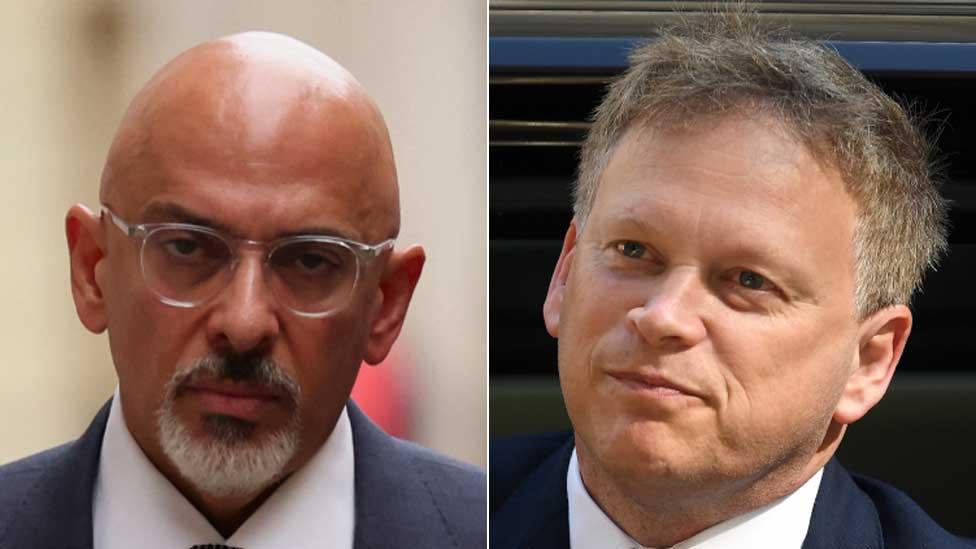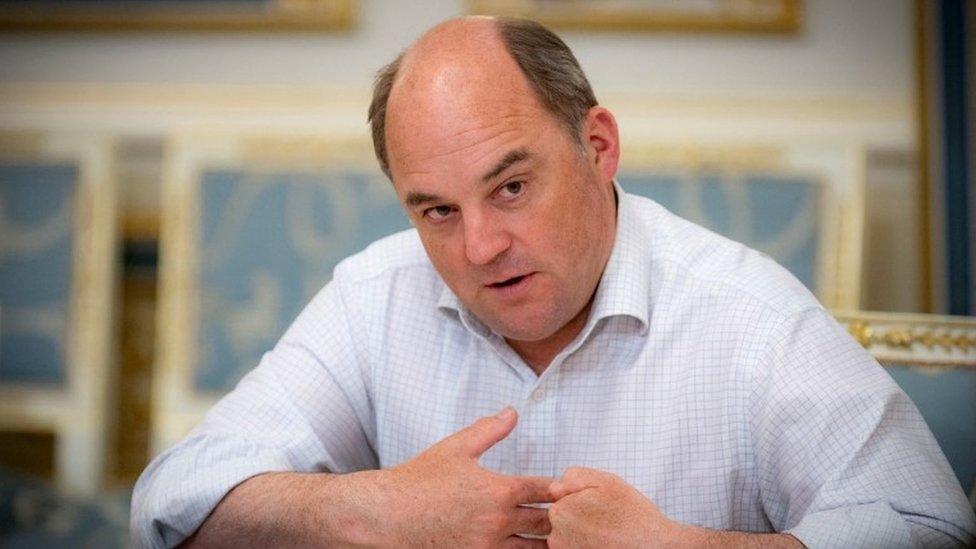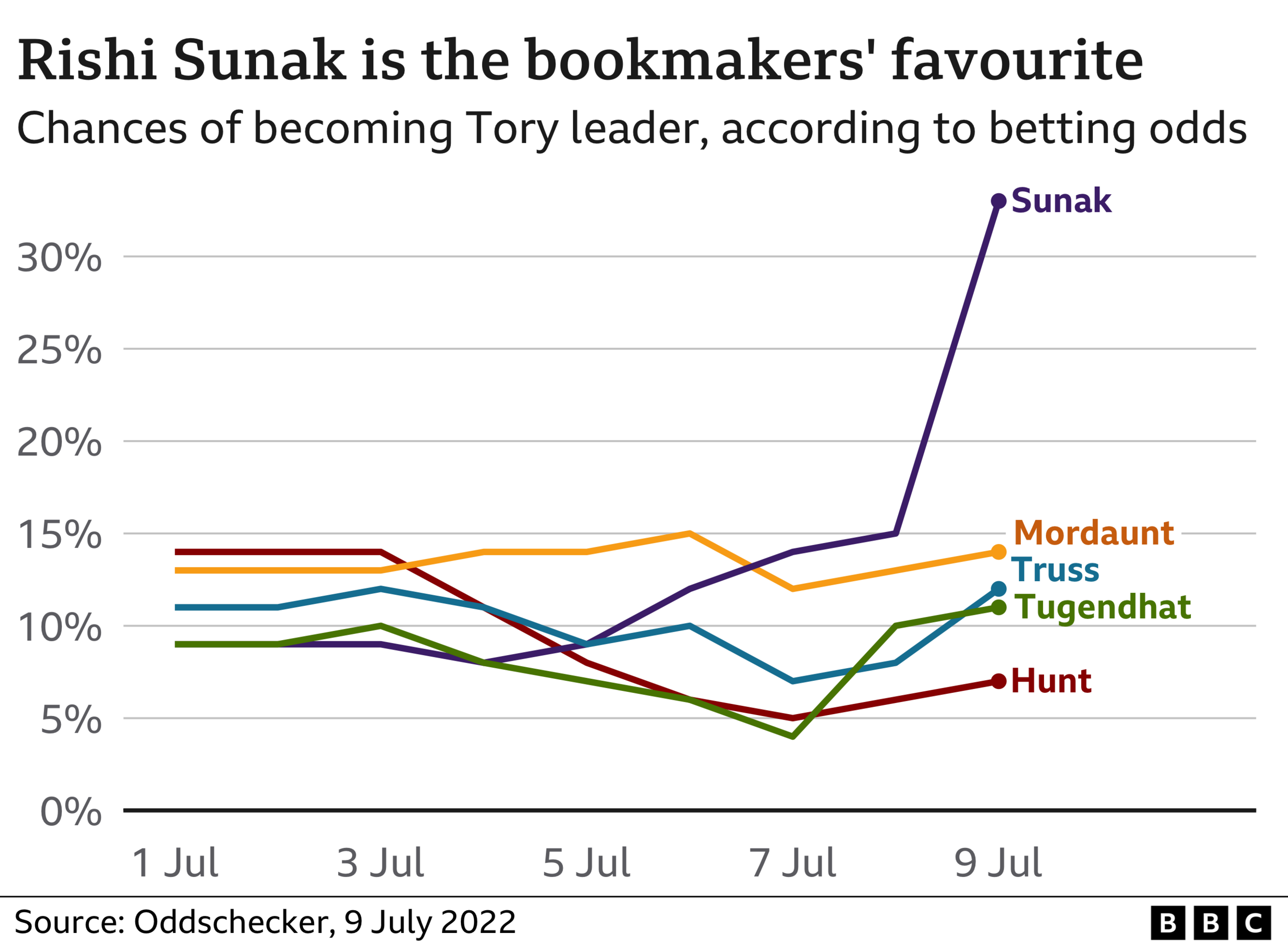Boris Johnson resignation: Zahawi and Shapps enter Tory leadership race
- Published

Chancellor Nadhim Zahawi and Transport Secretary Grant Shapps have launched their bids to replace Boris Johnson as Conservative Party leader and PM.
Mr Shapps told the Sunday Times he was ruling out a general election if he was successful in becoming prime minister.
Mr Zahawi has said he will lower taxes, boost defence spending, and continue with the reforms he began while education secretary.
Earlier, Defence Secretary Ben Wallace said he would not run.
The cabinet ministers join former chancellor Rishi Sunak, Attorney General Suella Braverman, former equalities minister Kemi Badenoch and chairman of the Foreign Affairs Committee Tom Tugendhat in the race to take over from Mr Johnson.
Allies of Liz Truss have said the foreign secretary would also throw her cap in the ring to replace the prime minister on a ticket of reversing Mr Sunak's health tax, according to the Mail on Sunday, external.
Launching his bid for leader, Mr Zahawi - who was appointed chancellor last Wednesday after the resignation of Rishi Sunak - said he planned to "steady the ship and to stabilise the economy".
He said: "My aim is a simple one: to provide the opportunities that were afforded to my generation, to all Britons, whoever you are and wherever you come from.
"Thanks to Brexit, we are now a free nation. Let's not just talk about the opportunities that follow, let's take them."
The former education secretary added that he wants to "focus on letting children be children, protecting them from damaging and inappropriate nonsense being forced on them by radical activists".
Born in Iraq, Mr Zahawi and his family were forced to flee when Saddam Hussein came to power.
He became MP for Stratford-on-Avon in 2010 having first set up a firm selling Teletubbies merchandise and founding polling company YouGov.
Twenty-four hours after he was promoted to the Treasury, Mr Zahawi joined a group of ministers on Thursday who told Mr Johnson to go.
Meanwhile, Mr Shapps pledged to produce an emergency budget, instruct his chancellor to cut personal tax for the poorest people and give state support to businesses with high levels of energy consumption.
He was one of the senior cabinet ministers who did not resign during a chaotic week in Westminster which led to Mr Johnson's resignation.
Appearing to criticise colleagues who did, he told the paper he had "not spent the last few turbulent years plotting or briefing against the prime minister" or organising a leadership campaign in the background.
He told the paper, external: "I tell you this: for all his flaws - and who is not flawed? - I like Boris Johnson. I have never, for a moment, doubted his love of this country."

Defence Secretary Ben Wallace announced he would not be joining the race to replace Mr Johnson
Mr Shapps served as a minister under both David Cameron and Boris Johnson and was appointed co-chairman of the Conservative Party in 2012, staying in the post for three years.
The most high profile candidate to replace Mr Johnson so far is former Chancellor Rishi Sunak, who launched his campaign on Friday saying "someone has to grip this moment and make the right decisions".
Mr Sunak's resignation from the cabinet on Tuesday helped trigger the mass walkout of ministers that forced the PM to stand down as Tory leader.
While several senior Tory MPs have endorsed his campaign, a No 10 source told the BBC there was "real disappointment" with Mr Sunak in Downing Street, saying the prime minister had "backed him to the hilt" by appointing him chancellor.
Mr Johnson has said he intends to stay on in Downing Street until a successor is chosen.


Suddenly the race is gathering pace.
Among the confirmed contenders for the Conservative leadership are some familiar faces as well as relative unknowns.
Those with a lower profile will need to try to cut through in a contest where experience is likely to count for a lot.
Cutting taxes and shrinking the state are familiar themes put forward by those declared so far.
Personality matters as well as policy though, and some candidates are emphasising their personal stories of success.
At this early stage the hopefuls have to show what sets them apart from the rest, while making a broad pitch for support from as many MPs and party members as possible.

Former equalities minister Kemi Badenoch confirmed her candidacy in the Times, external, telling the paper she wanted a limited government and to "tell the truth".
Writing in the Daily Express, Ms Braverman pledged she would bring in "rapid and large tax cuts" as leader.
Following his announcement, Mr Tugendhat - MP for the Kent seat of Tonbridge and Malling - told BBC South East: "I've spent 10, 15 years serving our country in uniform, I've spent six, seven years now serving our community in Parliament, and I'd like the chance to serve again because I think this country matters."
Mr Wallace's decision not to enter the contest came despite him topping leadership surveys run by the website Conservative Home - which is popular with grassroots Tories - and was the bookmakers' favourite.
There will now be a lot of interest in which of the candidates he endorses, as getting him on board is likely to be a big boost to their campaign.
